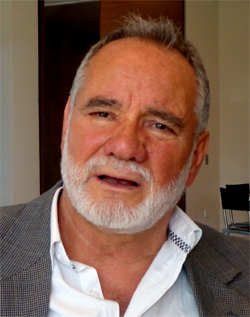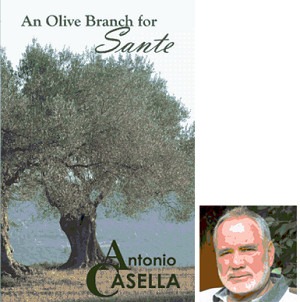Mar 31, 2025
Mar 31, 2025
 Antonio Casella was born in Italy and migrated to Australia as a 15 years old. He published his first novel in 1980. His short stories have appeared in magazines and newspapers in Australia and overseas. He completed an MA in Creative Writing at UWA and a Ph.D at Murdoch University. He was writer in residence at the Australia Council’s Whiting studio in Rome in 1996. His novels are reading wonder. He engages a reader with well-knit plot and the gusto of intensity. He is not a common narrator; an outstanding story teller who follows the picaresque trend. Walter Tonetto in The West Australian observes, “Dream and ritual intersect with the real man, define the purpose of things." At present, he lives with his family in Perth,WA.
Antonio Casella was born in Italy and migrated to Australia as a 15 years old. He published his first novel in 1980. His short stories have appeared in magazines and newspapers in Australia and overseas. He completed an MA in Creative Writing at UWA and a Ph.D at Murdoch University. He was writer in residence at the Australia Council’s Whiting studio in Rome in 1996. His novels are reading wonder. He engages a reader with well-knit plot and the gusto of intensity. He is not a common narrator; an outstanding story teller who follows the picaresque trend. Walter Tonetto in The West Australian observes, “Dream and ritual intersect with the real man, define the purpose of things." At present, he lives with his family in Perth,WA. J.S.:How many novels you have written so far?
J.S.:How many novels you have written so far?
14-Jun-2013
More by : Prof. Jaydeep Sarangi

|
wonderful n thought-provoking interview with utmost lucidity and smoothness as well. Apt interrogation from Dr. Sarangi's side and at the same time deliberate and prompt reply from Antonio Casella. |

|
Without doubt readers will relate to the sentiments of "An Olive Branch for Sante", whether or not they have Mediterranean connections. Some aspects of the human condition are universal, and that's what keeps a reader engaged: curiosity about an unfamiliar culture by relating to feelings common to us all. |

|
Great to know about the great Australian novelist Antonia Cascella. . Congratulations!! Wonderful interview !! Commendable work done by Antonia ! Keep it up and Best luck for future endeavours. Thanks and Congrats to Dr Jaydeep Sarangi for his fantanstic work. Best wishes !! |

|
Congrats to Antonio and Jaydeep two thinking heads from two continents. Great work! |

|
It's a wonderful analysis of Antonio's achievement ... a poet taking about a poet is always absorbing |

|
The scent of the Mediterranean is clearly exhibited in you Antonio. The long journey you and your folks had made at that early age to the new world and the struggle to adopt show the strength of your faith. You have no doubt given that special flavor of virgin olive oil to the Australian literary works. |

|
Came to know about Antonio's latest novel 'An Olive Branch for Sante'.The interview is fascinating.It connects Australia and Sicily. More to flow from his pen!....Sourav |

|
A most enjoyable and enlightening article/interview. Thanks Dr Sarangi for bringing Antonia Casella to our attention. Rob |

|
Hope this interview will help research on contemporary Australian writers.Antonio engages a thinking mind. |